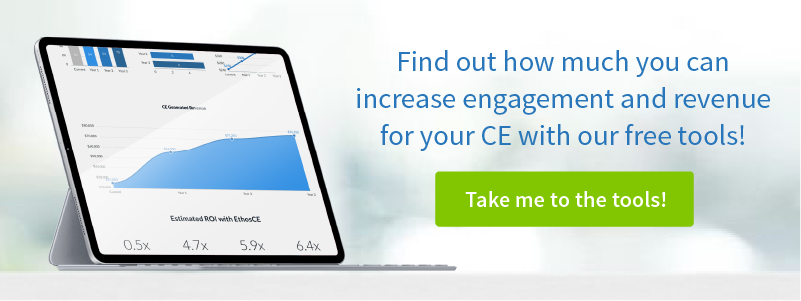Staffing Your LMS Project
An enterprise learning management system is a powerful training tool. To get the most return on your investment, you need to have the correct team members in place to ensure success.
At EthosCE, we have worked with a variety of organizations of different sizes and levels of sophistication. We’ve learned that good technology alone isn’t enough — staffing is a key part of implementing a learning management system (LMS).
In this article I am going provide an overview of skills and roles needed to implement an LMS. Each role does not have to be an filled by a separate person. A smaller organization with fewer learners could run an LMS with one skilled employee. However, larger organizations with tens or hundreds of thousands of potential learners will likely need to have many resources available either as staff members, consultants or through the LMS vendor.
Here is an overview of staffing needs for an learning management system implementation.
 Project Management
Project Management
When initially implementing an LMS, having a skilled technical project manager to drive the project should be considered “a must.” The project manager will work with internal stakeholders, your LMS partner and other vendors to help establish a project plan and create a set of requirements necessary for a successful implementation.
Once implementation has started, the PM must coordinate and prioritize tasks, staff, and resources. The PM will likely be more successful if he or she has some LMS or other technical background.
 Site Manager
Site Manager
The site manager is a critical role and is responsible for oversight of the learning management system software. An LMS is not “brochureware” — you cannot “launch it and forget it.” It needs to be actively managed to be successful. This is where the site manager comes in. The site manager is responsible for, among other things:
- Loading course content
- Ensuring courses are configured to match the required business rules
- Editing promotional copy and images to best fit into the LMS
- Search engine optimization
- Creating and editing certificate templates
- Helping other staffers use the system
- Troubleshooting
- Ensuring data accuracy
- Site monitoring for user and technical issues
 Course Authoring
Course Authoring
When creating your educational materials, you should have access to experienced staff. It is unlikely a single person will be able to complete authoring a complex course from start to finish without any help. The following skills may be required depending on how ambitious you want to be with your course.
- Subject Matter Expert: Make sure you engage a writer or editor who is truly versed in the topic. It is unrealistic to expect an instructional designer or project manager to quickly learn enough on a complex topic to produce credible course content alone. Lack of expertise will be noticed by your audience and damage your reputation. Inaccurate content could potentially cause harm. Subject matter experts can be full-time staff, consultants or volunteers.
- Instructional Designer: The instructional designer is versed in instructional models and will help you achieve educational outcomes through the application of a systematic process of course development. The instructional designer will help define the target learner type, identify knowledge gaps and close such gaps using a recommended learning intervention based on theory, best practices and professional experience.An instructional designer may have skills to cover production roles listed below, or you may need to contract these skills.
- Copywriter
- Editor
- Photographer
- Photo editor
- Photo researcher
- Multimedia production (audio, video)
- Multimedia post production
- Web developer
![]()
Marketing
Your learning management system will need learners and participants to be successful. Although this seems obvious, attracting learners is often overlooked when planning for an LMS. Whether they are internal learners, such as employees, members, or paying customers, learners need to be convinced to spend time or money on your programs.
Your marketing effort should be coordinated with your organization’s existing marketing and communications departments, but also may require a more specific focus. Courses need promotions, images, email blasts, tweets and posts to be publicized.
Although it’s unlikely you need a full-time staffer just to market the LMS and courses, you should be prepared to have resources available for the following:
- Branding: How your LMS is adopted by your learners has a lot to do with perceived value. Do you want to project a serious professional brand, or a more casual community brand? A marketing professional with branding experience will help you define that brand and communicate it to your learners in the appropriate fashion.
- Copywriter: Your LMS comes with many valuable features that add value to your learners’ professional careers. A copywriter can help you educate your learners about what they can get out of the LMS above and beyond just taking a single course. For example, educating learners about the value of a transcript history or the opportunity to communicate with an instructor.
- Designer: You may want your LMS to have a unique look and feel or match your organization’s brand exactly, but either way, you will need a designer to prepare graphics. A designer can also help with ongoing design needs such as designing home page course promotions and email blasts.
![]()
Learner Support
Once your site is humming along, you can expect learners to have problems. From the simple (“How do I register?”) to the inane (“Do you support the TRS-80?”), you need to have someone who can quickly and confidently answer these questions. Support staff should have adequate training so they can answer most questions themselves without having to escalate to more senior staff.
Learner support can also be augmented with a list of frequently asked questions, which can range from technical questions to organization-specific questions. Once your LMS launches, keep a list of learner questions and use them to form the basis of your FAQ. Post the FAQ in a prominent spot on your site.
 Technical Support
Technical Support
If you are hosting the LMS yourself, your IT staff will need to manage the servers, databases and perform routine maintenance and backups. Involve the IT staff early to make sure they have time to train up on relevant skills if necessary.
If your LMS is SaaS (software as a service) or is vendor-hosted, it may not be necessary to have IT staff.
Staffing Phases
Implementing an LMS will require differing staff commitments at different times. When planning your resource allocation for the LMS project, try to plan ahead to let other departments know when you will need their resources — needs will change depending upon the project phase.
At implementation, focus will be heavy on setting up and configuring the LMS, requiring more time from the project manager, site manager, marketing and IT staff. The project manager and IT staff might be engaged full-time during the implementation phase, while the site manager and marketing staff are ramping up to launch.
Immediately before and after launch, all staff should be available to quickly address critical issues.
Once the project is well past launch and has moved into the stable phase, more time will be needed from support staff as the number of learners and courses grow. Course authors will continue to be needed as new courses are added on a rolling basis. Depending on the number of courses you plan to host, this could potentially be a full-time role.
Overall, the addition of an LMS to an organization can offer tremendous benefits, as long as it’s given the attention and resources needed for a proper rollout and ongoing support. The more integrated it becomes into your organization’s existing and planned initiatives, the better the chances of the LMS being a valuable resource for your learners and organization.
 We're now part of the Cadmium product suite! Learn more
We're now part of the Cadmium product suite! Learn more 

